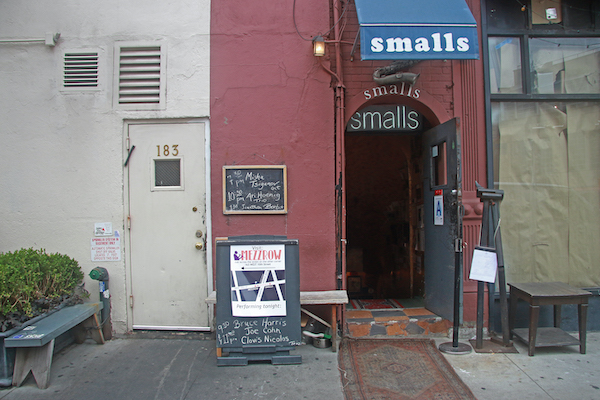Jan 13, 2026 2:09 PM
More Trump-Kennedy Center Cancellations
The fallout from the renaming of the John F. Kennedy Center for the Performing Arts to include President Donald…

Spike Wilner, proprietor of the New York venue Smalls, recently began hosting shows at his club for the first time since the pandemic hit.
(Photo: Courtesy of Smalls)Then on April 15, Wilner posted the following message on Facebook: “This club is coming back—we are not done!”
What changed?
“We got a PPP loan,” Wilner told DownBeat later in April, referring to the Paycheck Protection Program. “That will help us secure Smalls for the next four to five months, until we can get things going again. With Mezzrow, I’m not sure what’s going to happen yet.”
Wilner began hosting shows at Smalls, with only performers and a sound sound engineer present, during the past few days.
He said he went through “a dark period” following the initial closure of both clubs, but that his mood lifted considerably after receiving an early April phone call from Wynton Marsalis, who was working to secure funds for musicians and small venues. The Louis Armstrong Foundation, of which Marsalis is board president, established the Emergency Fund for Jazz Musicians to award one-time grants of $1,000 to freelance jazz musicians affected by the shutdown. The foundation committed to awarding 1,000 grants, totaling $1 million.
“Wynton asked me to be on his committee to help decide who gets the money,” Wilner said. “I put together a list of about 350 musicians who I thought could use it. They did a beautiful thing. It’s not a lot of money, but it’s a tremendous morale booster.”
The week before receiving the PPP funds, Wilner had completed the transformation of Smalls and Mezzrow into a nonprofit arts foundation, a project that had been in the works for two years. The SmallsLIVE Foundation subsidizes the expense of operating the clubs, assisting musicians and sponsoring jazz education programs. For a donation of $10, supporters can access a prodigious archive of performances from both venues—a collection of more than 17,000 live sets, dating back to 2007. Royalties are distributed to about 3,500 musicians who are included in the archive.
Wilner’s own foundation has started making emergency donations to jazz musicians in need as well.
Similarly, the Newport Festivals Foundation, which produces both the namesake jazz and folk festivals in Rhode Island, established the Newport Festivals Musician Relief Fund. Starting with a $20,000 emergency fund, NFF Executive Producer Jay Sweet and foundation board members decided the pandemic shutdown was a “break-glass-in-case-of-emergency moment.”
Sweet explained that, after only three weeks, donations had caused the fund to balloon to $160,000. “We’ve had 500 applications and, so far, fulfilled 275 of them,” he said in April. “These are [grants] for musicians who have played Newport, and other Rhode Island musicians—musicians whose names you would know. They each receive anywhere between $300 and $1,000. It’s like passing out Band-Aids on the battlefield.”
On April 28, both the Newport jazz and folk festivals were canceled; all artists who were slated to perform in 2020 have been invited back for the 2021 editions. Sweet isn’t worried about the foundation’s survival, though.
“The foundation will be OK. [Festival founder George Wein] will ensure that,” he said. “Right now, I’m focused on keeping our musicians musicians.”
While some well-funded festivals plan to be back in 2021, the future for many venues is murky.
“Jazz tourism in NYC is a big thing,” Wilner said. “We’re so dependent on it; any club owner in town will tell you that. We can’t run at capacity without our tourists, and God knows when that’s gonna come back to New York.”
Sweet, however, remains optimistic: “There’s something in our human DNA that needs to commune with others. For some, it’s religion; for some, sports; for some, music. I think the word ‘normal’ will be redefined. The one thing I still believe in, [and have] for my entire professional career, is the desire for human beings to congregate around music. It’s being tested now. I don’t think live music is remotely close to dead. People just cannot live without it.” DB
This story originally was published in the July 2020 issue of DownBeat.

Belá Fleck during an interview with Fredrika Whitfield on CNN.
Jan 13, 2026 2:09 PM
The fallout from the renaming of the John F. Kennedy Center for the Performing Arts to include President Donald…

Peplowski first came to prominence in legacy swing bands, including the final iteration of the Benny Goodman Orchestra, before beginning a solo career in the late 1980s.
Feb 3, 2026 12:10 AM
Ken Peplowski, a clarinetist and tenor saxophonist who straddled the worlds of traditional and modern jazz, died Feb. 2…

The success of Oregon’s first album, 1971’s Music Of Another Present Era, allowed Towner to establish a solo career.
Jan 19, 2026 5:02 PM
Ralph Towner, a guitarist and composer who blended multiple genres, including jazz — and throughout them all remained…

Rico’s Anti-Microbial Instrument Swab
Jan 19, 2026 2:48 PM
With this year’s NAMM Show right around the corner, we can look forward to plenty of new and innovative instruments…

Richie Beirach was particularly renowned for his approach to chromatic harmony, which he used to improvise reharmonizations of originals and standards.
Jan 27, 2026 11:19 AM
Richie Beirach, a pianist and composer who channeled a knowledge of modern classical music into his jazz practice,…